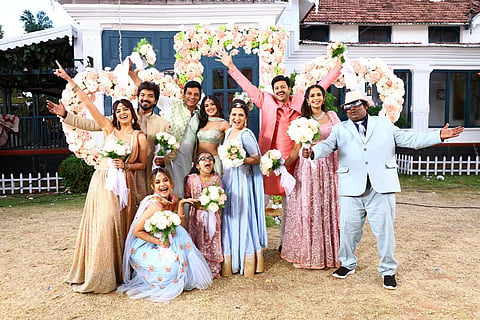

Director Sundar C believes in a simple life. He came into films, hoping to earn enough to afford a scooter and a strong cup of filter coffee. Three decades after making his debut, Sundar C has now directed A-listers like Rajinikanth, Kamal Haasan, and Ajith Kumar, delivered multiple hits and has established himself as a bankable actor as well.
“Direction was not my goal when I entered cinema. I thought production managers were the most powerful and wanted to become one. But soon, I realised they take orders from assistant directors, who in turn report to the director. So, I decided to become a director,” shares the filmmaker.
Rather fascinatingly, his newest release, Coffee with Kadhal, contains a reference to the beverage that began his whole filmmaking journey. For Sundar C, it has been a long-pending desire to make a film along the lines of, as he puts it, “Love Actually, When Harry Met Sally, You’ve Got Mail...” Here’s the filmmaker speaking of realising this dream, his changed notions over ‘glamour’ and more…
Tell us the story behind the title, CWK.
Anbe Va is a huge inspiration for me to make this film. AC Tirulokchandar sir set the right mood for the audience right from the title. ‘Nalam Vazha’ from Marupadiyum is one of my favourites. I wanted it to be the film’s title but it would have made the film feel dated. So, I went ahead with CWK, as the film slowly grows on you, just like a warm cup of coffee.
Did you have to re-invent your style of direction as CWK is your first emotion-heavy film?
No. Firstly, I don’t overexplain the scene or act it out for the actors to follow. I just give them the essence and expect them to add their personality to it. I believe doing so will naturally elevate the scene as the actors will add a flavour that I failed to see in the script. I stick to this method for all my films, CWK wasn’t any different.
You are among those filmmakers who have focussed on direction without necessarily feeling compelled to take on writing responsibilities as well.
I have always stressed the importance of working with a dedicated set of writers. Tamil cinema, unfortunately, hasn’t really woken up to it. We still believe that filmmakers should write their stories. We lose so many good screenwriters and directors due to this. Even when a good screenwriter emerges, producers force them to turn filmmakers. Hollywood pays the highest respect to writers. Only after a script is chosen, do they look for filmmakers—with casting being done by dedicated professionals. Here, all the burden falls on the filmmaker, starting from the simplest decisions like choosing a menu for lunch.
How do you work humour into your cinema?
I have never used comedy for the sake of doing so. I use it to cover up mistakes and flaws in my script, and as a tool to propel the story forward. For instance, in Winner, the relative living with Shakthi’s grandparents could have been a serious character, but we designed a Kaipullai there (played by Vadivelu) to add entertainment.
Do you find it hard to create comedy at a time of political correctness?
Absolutely! A creator has to take every step with caution now. For instance, Goundamani Annan’s brand of humour would not go down with the audience now. Being inclusive and considerate of everyone is a virtue, but I am worried though if our society has become over-sensitive. Apart from learning and unlearning, developing a thick skin is the only way ahead to prevent criticism.
Your films have also been noted for the ‘glamour’ quotient.
I don’t think of it as a necessary element anymore. Any person with a cell phone has access to titillating content that can’t make it to theatres anyway. I think a thin line differentiates glamour and vulgarity. If a girl appears on screen wearing a skirt, it is glamour, but if she wears a saree and lifts it to show her knees, this becomes vulgar. Above all, I believe the audience has evolved and celebrates actors solely for performances. Back during the day, even talented actors like Simran and Ramba were famous for a certain glam appeal. But this is the era of Sai Pallavi and Nithya Menen.
You are well-known for being a filmmaker who achieves a good work-life balance.
An average film runs for about 150 minutes, and so, if you shoot about two minutes of footage every day, I think it’s easy enough to finish a film. It puzzles me when directors shoot for months on end. I think this is caused due to a lack of planning.
I made such mistakes during my early days. Sometimes, impromptu additions work—like the classic hide-and-seek sequence in Ullathai Allitha. The script had just one line describing the sequence: Chaos in Jai Ganesh’s house leading to the kidnap of Mani Vannan. But we just improvised; magic like this happens rarely. I went through terrible times to learn the importance of planning.
You have had two successful franchises in - Kalakalappu and Aranmanai. Have you ever considered making sequels to other films?
Anbe Sivam! Kamal sir’s Nalla (Nallasivam) character has immense potential to work in another story. I have an idea for a journey Nalla takes right after the rainy climax scene. But it is in the hands of Kssswamal for such a sequel to get realised. I am game for it if he agrees.